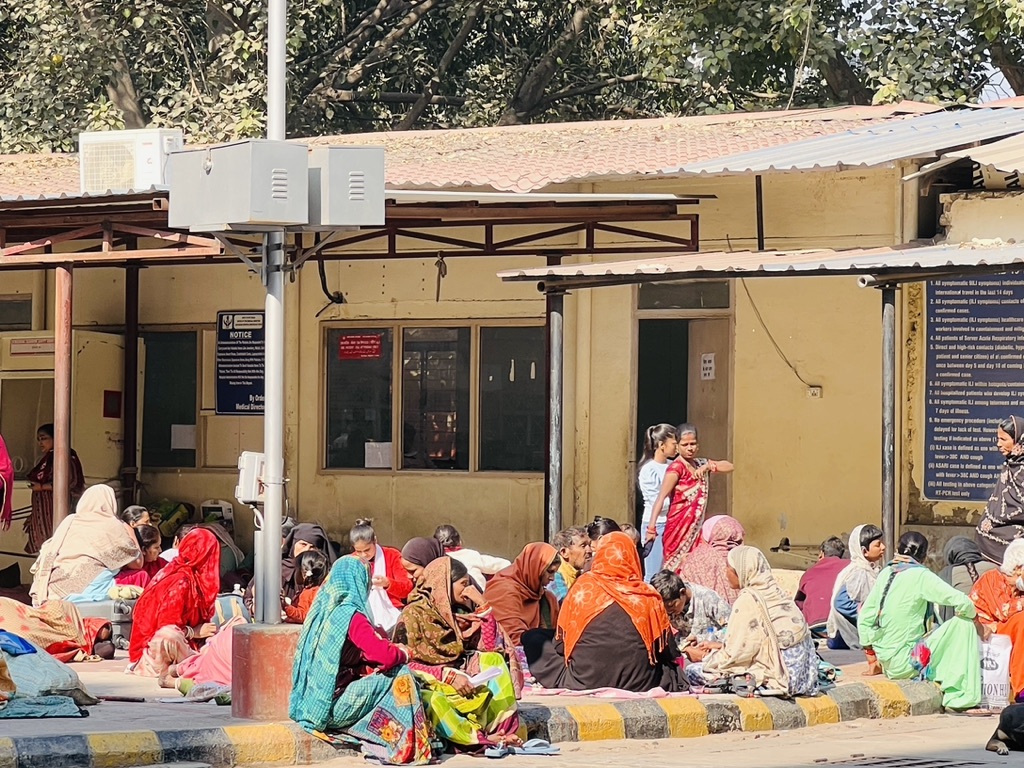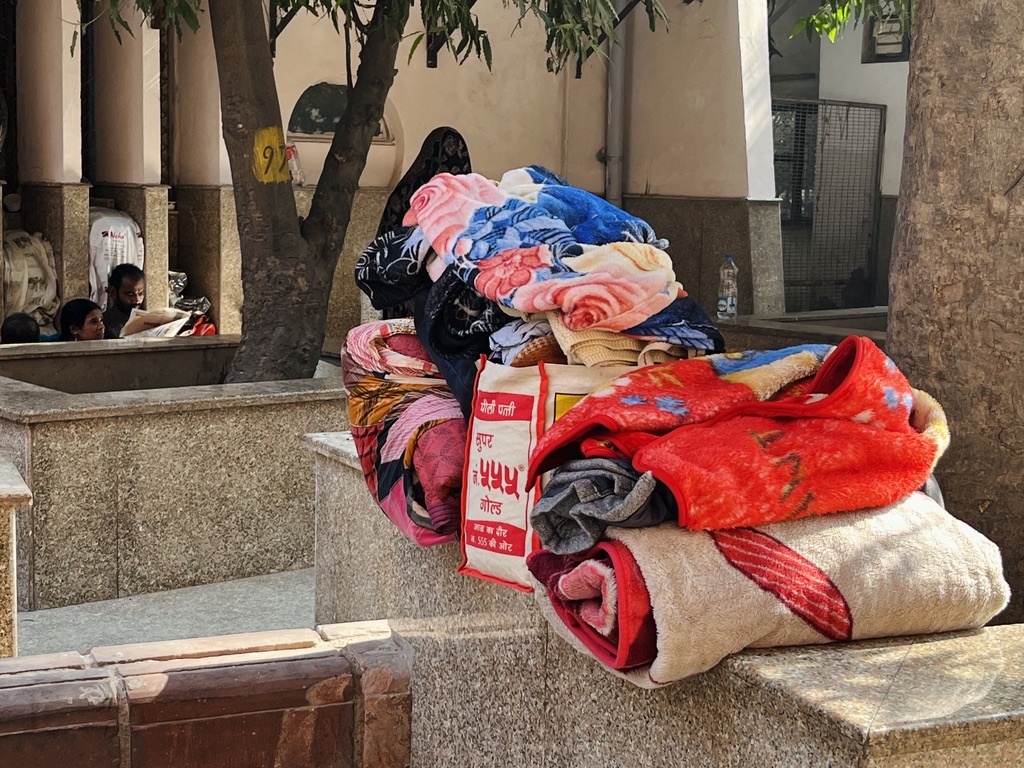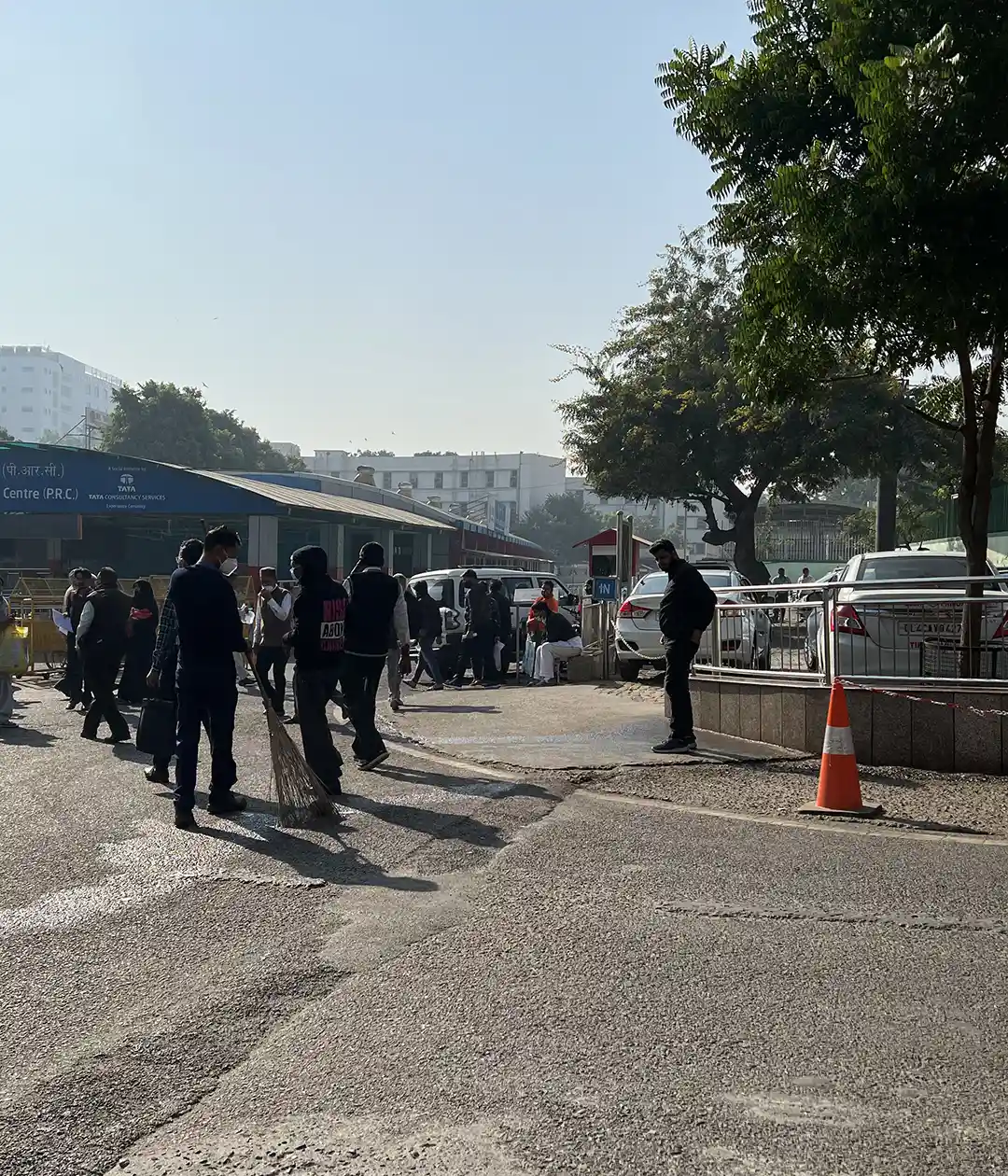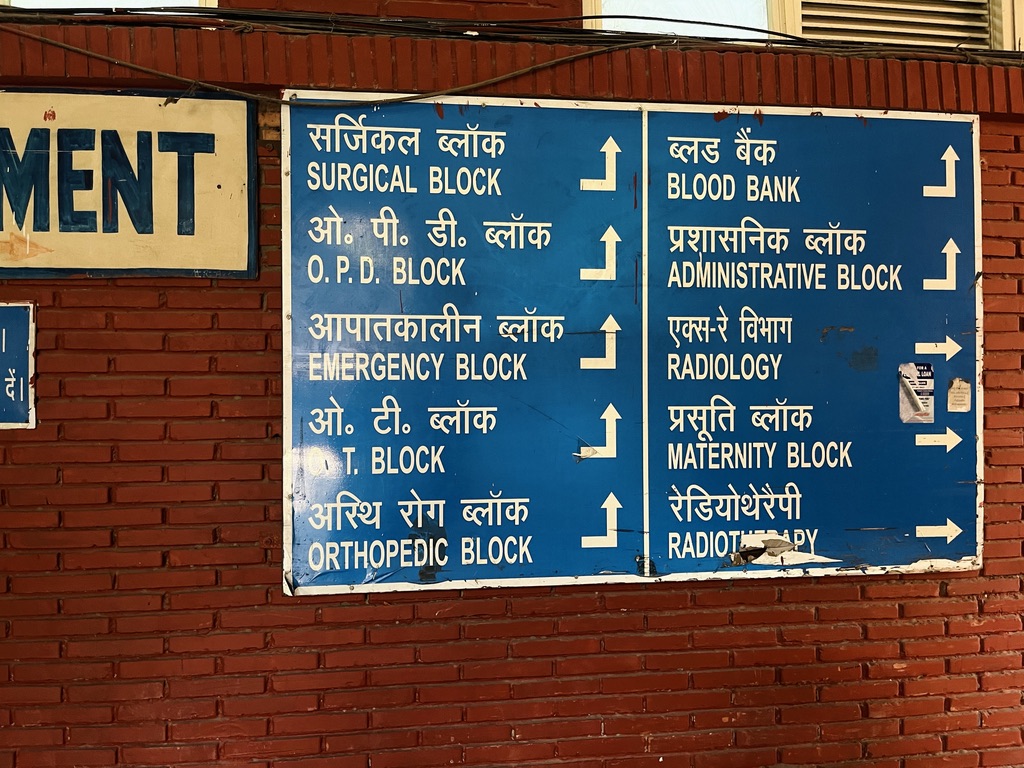इंतज़ार
Waiting
एक औरत अपने तीन छोटे बच्चों के साथ ज़मीन पर पन्नी बिछाकर बैठी हुई थी। उसे देखकर लगता था कि वह नींद के मारे कहीं ज़मीन पर लुढ़क न जाए। वो अपने दोनों हाथों को ज़मीन पर टिकाकर, खुद को सँभालने की कोशिश कर रही थी। काफ़ी देर तक वह इसी तरह वहाँ बैठी रही। उसके तीनों बच्चे उसी की ओर देख रहे थे।
A woman spread out a plastic sheet on the ground and sat down with her three children. She looked so weak and exhausted that she was barely stable. She had somehow kept herself upright by placing both her hands on the ground. She sat there like this for a while, surrounded by her children who gazed at her worriedly.
पंत अस्पताल का ये बड़ा हिस्सा भीड़ को अपने अंदर ज़ज्ब कर लेता है। इमरजेंसी और ओपीडी के सामने का ये खुला हिस्सा बैठने वालों के लिए अच्छा है। घंटों लाइन में लगे-लगे लोग थक कर यहाँ पर अपने बैठने के लिए जगह खोज ही लेते हैं। ये वे लोग भी होते हैं जिन्हें बेड नहीं मिलता या फिर रोज़ ओपीडी के चक्करों में फँसे रहते हैं। वैसे तो अमूमन इनका हालचाल पूछने वाला कोई नहीं होता। नाम पुकारे जाने के बाद जब कोई अंदर जाने के लिए नहीं उठता तो उधर से कोई न कोई टीबी वार्ड का स्टाफ इनको खोजने के लिए ज़रूर चला आता है। और जो आता वो गुस्से में ही होता।
This part of the G.B. Pant Hospital swells with a crowd that fills up every corner. The area between the ‘Emergency’ and the ‘Out Patient Department’ (OPD) is the best for those who have a long wait. Those standing in long queues always find a spot to rest their feet here. Often these are people who do not find a bed in the hospital or have become caught up in the complex web of the OPD operations. Usually no one bothers them here. However, if they don’t respond after repeated calls on the speakers, then the annoyed staff members come looking for them.
लेकिन आज एक शख़्स ऐसा था जो इनकी ख़ैर ख़बर लेने के लिए आसपास घूम रहा था। वह इसी अस्पताल में काम करने वाला स्टाफ था। वो इन लोगों की परेशानी को समझता था। लंबे और भारी शरीर वाला वह शख़्स पूरे खुले हिस्से में चारों ओर घूम रहा था। लोगों से बातें करते हुए और उनके काग़ज़ को देखते हुए, वह सबकी ख़ैरियत पूछ रहा था। आजकल वह शायद रोज़ आता है क्योंकि लोग इस व्यक्ति को जानते थे। वह जब मास्क लगाए, हाथों में ग्लब्स पहने और सर को भी ढके होता, तो भी लोग उसे पहचान लेते।
Today, the hospital staff member, mingling amidst the waiting patients and their families, seemed compassionate, someone who understood them. This heavyset man was moving around with such gentleness in the entire open area. He would stop and talk with people, ask them how they were and then look at all their documents. Perhaps he came often, as many patients seemed to know him. He was wearing a mask, a cap over his head and gloves on his hands. Yet most people recognized him. Some people would approach him just because he was dressed in hospital scrubs.
दिल्ली के किसी बड़े अस्पताल की रजिस्ट्रेशन ऑफिस के बाहर इंतज़ार करती महिलाएं।
दिल्ली के किसी बड़े अस्पताल के आँगन में इंतज़ार करते मरीज़ के परिवारवाले।
खासकर वह उन मरीज़ों को खोजने के लिए आया करता जिन्हें टीबी की बीमारी होती। वे चाहे दिल्ली के हों या दिल्ली से बाहर वाले मरीज़ हों। दरअसल इस तरह के मरीज़ दिल्ली के बाहर के ही अधिक होते हैं, उन्हें हर रोज़ अस्पताल से ही दवा लेकर खानी होती है। जो स्टाफ इन्हें देखने आया था वो दवा वाले काउंटर से आया था। कभी टीबी के डॉक्टर भी उसे टीबी के मरीज़ों को बुलाने के लिए भेज देते हैं। आज वह यह पता करने आया था कि मरीज़ दवा खाकर आए हैं या नहीं।
He would specifically seek out patients suffering from tuberculosis. There were some patients from Delhi, but most seemed to have travelled from outside. You could tell from the bundles of clothes and beddings they carried with them. TB patients need to come to the hospital daily for their medicines. The hospital staff insisted that the TB patients took their medicines in front of them, as later they might not take their medicines properly. The hospital staff member moving amongst the people today was specially looking for these TB patients. He would examine their documents and check to see if they had taken their medicines.
थोड़ी दूरी पर परिवार के साथ बैठे एक आदमी ने उस को आवाज़ लगाई, ‘कंपाउंडर साहब, आप यहाँ आइए, ज़रा देखिए इनको।’ वह चलते–चलते ही बोला, ‘अभी आता हूँ।’ वो हर किसी के पास जा–जाकर उनसे पूछता या उनके काग़ज़ देखता कि वह टीबी का मरीज़ तो नहीं है। इस तरह वो सभी के काग़ज़ देखता और आगे बढ़ जाता।
A man sitting at a distance called out, “Compounder sahib, please come here.” Compounder sahib would first check the patients’ prescriptions and test reports to ascertain what was the nature of their complaints and if they had a clear diagnosis. Many amongst them were new patients who needed help. They seemed lost in this sea of people, the different buildings in this large hospital compound, the overwhelming sounds and all the accompanying chaos. The compounder sahib needed to just barely glance at the documents to guide them towards the correct departments and tell them where they should go and what they should do.
कुछ लोग तो अस्पताल के इस बंदे को देखकर ही उसके पास चले जा रहे थे। वैसे भी मरीज़ बाहर बैठे ही रह जाते हैं। जिनके साथ कोई जानकार व्यक्ति होता है, वो तो अस्पताल के सारे झमेले सुलझा लेता है। लेकिन जिनके साथ कोई नहीं होता, वो यहाँ दिनभर ऐसे ही बैठे रह जाते हैं। कुछ लेटे हैं, कुछ बैठे हैं, कुछ घूम रहे हैं, कुछ खाना खा रहे हैं तो कुछ लोग अपने बीमार की सेवा में लगे हुए हैं।
Some people would approach the man just because he seemed like he was from the hospital. It was such a rare thing to find a hospital compounder actually moving amongst the patients to help them out. Often patients and their families would just sit in the hospital grounds, at a total loss because it seemed impossible that they would be able to figure out some sort of a system in this chaos. Patients would consult each other, to find out what to do or how to proceed. The entire open space was full of people waiting. Some lying down, some sitting, some roaming, some eating and some people taking care of their unwell family members.
फ़ूड ट्रक
Food truck
ऐसे भी सरकारी अस्पताल में इलाज़ कराना भी आसान नहीं है। महीनों से इलाज़ के इंतज़ार में बैठे लोग हर रोज़ पर्चे पर तारीख़ डलवाने के लिए ओपीडी की लंबी लाइन में खड़े रहते हैं। यहाँ पर डॉक्टर उसी पर्ची वाले मरीज़ को देखते हैं जिनके पर्चे पर आज की तारीख़ डली होती है। फिर उनका शुरू होता है इलाज़। जो नज़दीक रहते हैं वो रात से ही ओपीडी की लाइन में लग जाते हैं और जो दूर से आते हैं उन्हें अपने नंबर आने का इंतज़ार करना पड़ता है। सरकारी अस्पताल में कुछ लोग ऐसे भी आते हैं जो किसी से पैरवी कर अपना नंबर पहले लगा लेते हैं और जो छूट जाते हैं वे बस इंतज़ार ही करते रह जाते हैं।
Getting treatments at a government hospital isn’t easy. People spend months roaming around the OPD and have to sacrifice many hours standing around in the long queues. Every morning they must come to the OPD to get their papers stamped. The doctors would treat you only if you have a paper stamped from the OPD on the same day of the visit. People could spend months sitting in front of this OPD. Those who lived close by started queuing up during the night. Some people managed to bribe the hospital staff so they could skip these notorious OPD queues.
पन्नी बिछाकर बैठी महिला को अस्पताल के नियम-क़ायदों का पता ही नहीं था। वो अभी भी अपने बच्चों में ही लगी हुई थी। टीबी वार्ड का वही बंदा जब उसके पास पहुँचा और बोला, ‘पेपर दिखाओ मुझे, तुमने टीबी की दवाई खाई है या नहीं?’
The woman sitting on the spread-out plastic bag seemed to be totally unaware of all these mechanisms of the hospital. She was totally absorbed in her children. The compounder walked up to her and asked her in a loud authoritative voice, “Show me your papers. Have you had your TB medication today?”
ये औरत पिछले चार महीनों से रोज़ आकर यहीं पर बैठती है। तक़रीबन चालीस बरस की यह औरत अकेली नहीं होती, अपने बच्चों के साथ यहाँ आती है। इसके पति नहीं हैं। ये दिल्ली से बाहर पुराने फ़रीदाबाद से आती है। इसको टीबी की बीमारी है। जब उसने स्टाफ की ज़ोर की आवाज़ सुनी तो जल्दी से काग़ज़ों की पन्नी से एक बड़ा मटमैला लिफ़ाफ़ा निकाला और उसे थमा दिया।
This woman had been sitting here for the last four months. She was around 40 years old and was here with her children. She didn’t have a husband. She had come from outside Delhi, from old Faridabad. She had tuberculosis. When she heard the compounder’s commanding voice, she quickly took out an old crumpled envelope from her plastic bag of documents and gave it to him.
उसके सारे काग़ज़ों को उसने ध्यान से देखा। ओपीडी का काग़ज़ – नया और पुराना, दवाई की पर्ची, टेस्ट के काग़ज़, एक्स-रे, बाहर से लिखा उसकी पर्ची, उसका आधार-कार्ड, ओपीडी के काग़ज़ पर तारीख़ है या नहीं आदि। जब वह यह सब देख रहा था तो कुछ और लोग उसके नज़दीक आ गए थे। वे उनसे कुछ पूछना चाह रहे थे, लेकिन वह उन काग़ज़ों में ही उलझा था। भीड़-सी हो गई थी। कुछ अपने पेपर लेकर वहीं आ गए थे तो कुछ अन्य जानकारी लेने के लिए उसके आसपास खड़े हो गए थे। काग़ज़ों को देखकर उसने उस औरत को कहा, ‘ये सारे काग़ज़ पुराने हैं, तुमको समझ में नहीं आता है क्या? नए वाले कहाँ है? निकाल कर रखो।’
The compounder examined all the papers carefully. The new and the old OPD documents, her medical prescriptions, test reports, X-rays, some prescriptions made by doctors outside the hospital and her Aadhaar card. He even checked to see if the date was correctly stamped on her OPD document. Many people had surrounded the compounder with their own documents and questions. But he focused on the woman sitting on the ground. “These are all old documents. Where are all your new documents? Take them out.” He returned all the papers to the woman who started going through her bag looking for the new documents.
एक आवश्कयक सूचना
Announcement
यह कहकर वह दूसरे मरीजों की ओर मुड़ गया। वह औरत वहीं पर बैठी-बैठी उन काग़ज़ों को देखने लगी। अपने आसपास लगी भीड़ को वह समझाने लगा। यह उसका काम नहीं था, लेकिन वो देख रहा था कि उन मरीज़ों को कुछ मालूम ही नहीं है कि उन्हें आगे क्या करना है और जाना कहाँ है? एक जगह चटाई बिछाकर पूरा परिवार बैठा हुआ था, टीबी वार्ड वाला वही स्टाफ उसके पास पहुँचा।
The compounder moved on. He was constantly answering questions and explaining things to the small crowd which was perpetually following him. Perhaps this wasn’t his work, but he could see that there were so many people who were lost and did not know where to go. Nearby, there was an entire family which had spread out all their papers on a mat and were trying to make sense of them.
‘हाँ जी! आपका क्या है?’
उस परिवार से एक व्यक्ति ने अपने मरीज़ के पेपर को उसे पकड़ाते हुए बोला, ‘जी! इनको टीबी की शिकायत बताई गई है।’ पूरे पेपर को देखते हुए उसने कहा, ‘तुम्हें कैसे पता कि इन्हें टीबी की शिकायत है?’
‘जी! हमारे मोहल्ले के डॉक्टर ने बोला था।’
वह थोड़ा झल्लाते हुए कहा, ‘भाई साहब टेस्ट तो इसमें एक भी लिखा नहीं है और आप सीधे-सीधे टीबी बोल रहे हो । मैं पर्चे को देखकर कैसे समझूँ कि इनको क्या है? पहले पूरा टेस्ट तो कराओ। तुम चलो मेरे साथ।’
“What is your purpose here?” the compounder asked them. One of the family members picked up a document and handed it over to the compounder and said, “He has TB.” “Who told you that he has TB?,” the compounder responded. The person looked down and said, “Our local doctor told us.” The compounder seemed to understand the lowered gaze: “There are no papers here to show that the patient has been tested and you are already saying tuberculosis. Let’s first get some tests. Come with me.”
वह स्टाफ जिस तरफ़ भी जाता, सबकी नज़र उस ओर ही होती। भीड़ का कुछ हिस्सा, इन सबसे अनजान अपने में ही लीन था। मरीज़ के परिजन ऐसे ही लोगों का इंतज़ार करते हैं जो इनके पास आए, इनकी मदद करे और बताए कि कहाँ जाना है और किसे दिखाना है। अस्पताल में इस स्टाफ जैसा शायद ही कोई और हो जो हर व्यक्ति के पास जाकर पूछता है, और आगे बढ़कर समस्या सुलझाता है।
The eyes of the crowd followed the compounder wherever he went. However, some did not seem to have noticed the man at all, and were lost in themselves. People accompanying the patients wait for such persons to help them out and to guide them in this vast place. The compounder went to every patient and also spoke with the people accompanying them.
अस्पताल के खुले मैदान में बैठे कुछ ऐसे लोग भी थे जो बहुत बूढ़े थे और उनके साथ कोई भी नहीं था। गेट के अंदर, दुकानों के सामने, पेड़ के नीचे और नलके के पास। चारों तरफ बस लोग ही लोग।
In the open field, there were many older people who were perhaps not accompanied by anyone. Inside the gate, in front of the shops, under the trees and near the water taps. There were people everywhere.
वह स्टाफ फिर से उसी औरत के पास गया और बोला, ‘निकाल लिए नए काग़ज़?’
The compounder then went back to the woman with her children and asked, “Have you taken out the new papers?”
उसने कुछ और काग़ज़ दिखाए। वो उन्हें देखते हुए बोला, ‘इसमें आज की तारीख़ क्यों नहीं डलवाई?’ वो कुछ नहीं बोली बस अपने बच्चों की ओर देखती रही। वो समझ गया और बोला, ‘तुमको रोज़ तारीख़ डलवानी है। बिना तारीख़ के यहाँ कुछ नहीं होता। कब से इलाज़ करा रही हो तुम?’
The woman took out the papers again. The compounder saw the papers and asked her, “Why haven’t you got these stamped with today’s date?” She didn’t respond and instead began looking at her children. The compounder understood her silence. “You have to get your papers stamped with the date every day. When did you start being treated?”
उसने कहा, ‘चार महीने हो गए भैया।’
She said, “It has been four months, brother.”
स्टाफ ने कहा, ‘तुम्हें नहीं पता, तारीख़ डलवानी होती है न! चलो मेरे साथ।’
The compounder said, “Son’t you know that you must get a date stamp every day? Come with me.”
थोड़ी देर के बाद, उसने उस औरत को ओपीडी की लाइन में लगा दिया और कहा, ‘यहीं खड़ी रहना।’
वो अंदर गया और थोड़ी ही देर में बाहर आया और बोला, ‘लो तारीख़ डलवा दी है अब तुम दूसरी मंज़िल पर जाकर चार नंबर कमरे में डॉक्टर से दिखा लो।’
He took her to the OPD queue and told her to wait. He then went inside and got the woman’s documents stamped himself. He then guided the woman to the correct room on the second floor.
अस्पताल परिसर विभिन्न विभागों और सुविधाओं की ओर संकेत करने वाले बोर्डों से भरा पड़ा है।
पंत अस्पताल के गेट के अंदर घुसते ही ऐसे लोगों से भरा यह जगह दिखता है। यहाँ पर मैदान में छोटे-छोटे गुटों में लोग बैठे हुए मिलते हैं। कुछ लोग पहली बार इस अस्पताल में आए थे और कुछ लोगों के लिए यह पहले से चला आ रहा सिलसिला था। इन्हीं में से कुछ लोग दवाइयाँ लेने के लिए दुकानों पर जा रहे थे। कुछ मरीज़ फॉर्म भरने में व्यस्त थे। कुछ सुस्ता रहे थे तो कुछ गहरी नींद में थे, मानो कई रातों से सोए न हों। यूँ तो यहाँ बैठे लोग एक-दूसरे से अनजान थे। टीबी वार्ड के सामने वाले इस हिस्से में सभी धूप से बच रहे थे और एक ही साथ छाँव में बैठे थे। उनकी अपनी या उनके नज़दीकी व्यक्ति की बीमारी जल्दी ठीक हो, इस उम्मीद में शाम होने तक सभी बैठे रहते।
People were sitting in small groups in the field at the hospital entrance. For some this was their first experience, while for others this had been going on for a long time. Some of the people were patients, while some were their family members. Some were going to the chemist on the premises to buy medicines, while some were busy filling forms. Some people were resting, while others were fast asleep, as if they hadn’t slept for many nights. Some were eating their lunch in a hurry. Most people didn’t know each other here, and yet all were trying to find shade from the same harsh sun. All were sitting with hope for a new day. A day in which they would find cure and they would finally heal.






